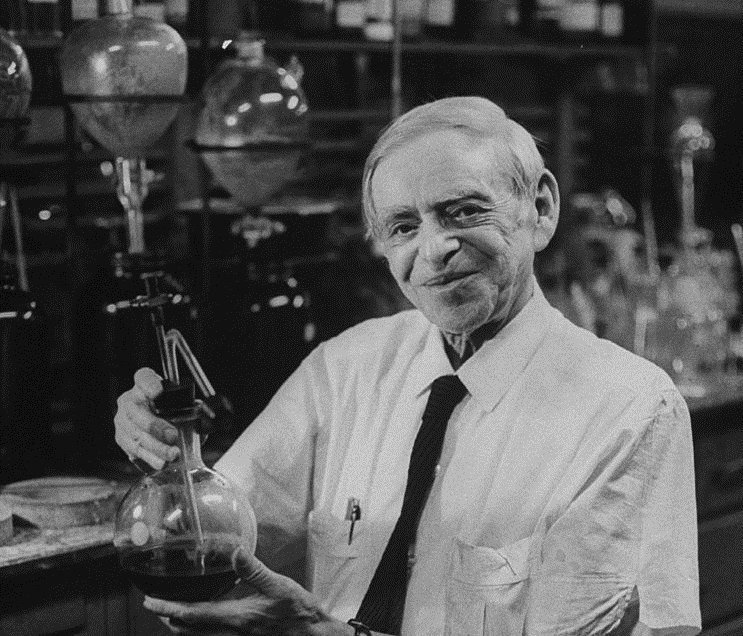Official:
Casimir Funk. 23 February 1884 – 19 November 1967. Polish and American biochemist. “Inventor” of vitamins.
Life and Work:
1. Back in 1880, the Russian scientist Nikolay Lunin proved that the body needed special substances which he did not name. Ever since, the scholars from different countries accumulated evidence of these special substances. Casimir Funk, a Polish scientist, took a last step as he isolated a substance from rice hulls which could cure the mysterious beriberi.
2. It was that special substance: Funk called this substance a “vitamine” derived from the Latin word “vita” meaning “life.” He also introduced the term “vitamin deficiency” so that everyone knew what life lacks to sustain life.
3. The author of the term “vitamin deficiency” was born into a physician’s family – where else could the savior of the mankind have been born? His father, Jakub, was a famous dermatologist in Warsaw but he advised his son against going into medicine. He recommended that Casimir should study biochemistry.
4. Casimir Funk took his father’s advice. At the age of twenty, he graduated from the University of Bern in Switzerland. He dedicated his doctoral thesis to compounds later used as a replacement for female hormones.
5. The newly-made doctor was immediately invited to take a position at the Pasteur Institute in Paris. But the young scientist did not stay in the French capital as he departed for Berlin to do research, then he moved to the Lister Institute of Preventive Medicine in London. This is where he made his historic discovery.
6. It is no coincidence that Casimir Funk chose rice hulls because the Dutch pathologist Christiaan Eijkman had already proved that rice hulls helped prevent beri-beri. People who ate brown rice had practically no beri-beri while those who consumed polished rice suffered from the high mortality rates.
7. As it turned out much later, a ton of rice hulls produced only a teaspoonful of pure thiamine or, as we are more accustomed to calling it, Vitamin B1. But Funk obtained small crystals. As it turned out later, however, Funk did not obtain chemically pure thiamine. Instead, he got a mixture of thiamine and niacin, i.e., Vitamin PP or the nicotinic acid.
8. For the substance he obtained, Funk coined a beautiful name, “vitamine” – “vitae animae” derived from the Latin “vita” = life and “amine” = nitrogen-containing compound.
9. Funk also proposed that other diseases, such as scurvy, pellagra, rickets, could also be caused by the deficiency of vitamins: “The diseases mentioned above present certain general characters which justify their inclusion in one group, called deficiency diseases which are caused by a deficiency of some essential substances in the food. It is now known that all these diseases, with the exception of pellagra, can be prevented and cured by the addition of certain preventive substances,” the scientist wrote. “The deficient substances, which are of the nature of organic bases, we will call ‘vitamines’; and we will speak of a beriberi or scurvy vitamine, which means, a substance preventing the special disease.”
10. The Lister Institute did not allow Funk to use the term “vitamin” which Funk titled the article about his discovery with. Funk later had his way and published his definitive paper, “The Etiology of the Deficiency Diseases,” sidestepping the institute administration. And the term reached out science and people.
11. World War I ousted Funk from Europe to USA and he even became a U.S. citizen. But The Rockefeller Foundation offered him to take the helm of the biochemical department at the National Institute of Health in Warsaw and the scientist accepted the offer. Later, Funk created a biochemical laboratory in Paris and headed it almost until World War II.
12. In 1936, Funk completely deciphered the structure of Vitamin В1 and developed a method to synthesize it.
13. Funk was fluent in Polish, Russian, French, German, and English and translated his papers himself.
14. “The deficiency of vitamins does not always come from abstentious meals. The food may contain products short of their health properties due to incorrect storage, continuous transportation or multiple heat treatment. The vegetables and fruits grown in the soil with a low concentration of minerals are very poor in substances essential for the body. Therefore, a nutritious diet requires a wide range of different vitamin supplements,” Casimir Funk wrote.
15. In the United States where Funk returned shortly before the World War II the scientist cooperated with the Institute of Vitamins and then established the Funk Foundation which he was president of until his death.
16. Among Funk’s other scientific achievements are the study of hormones, cancer, ulcer and diabetes and developments in biochemistry of nutrition. The scientist was first to isolate the pure nicotinic acid.
17. The discoverer of vitamins and the author of the term proper did not receive the Nobel Prize in physiology and medicine in 1929 which was awarded to his predecessor Eijkman and the British scientist Hopkins who also suggested that there are some “accessory food factors” without which animals cannot grow.






















